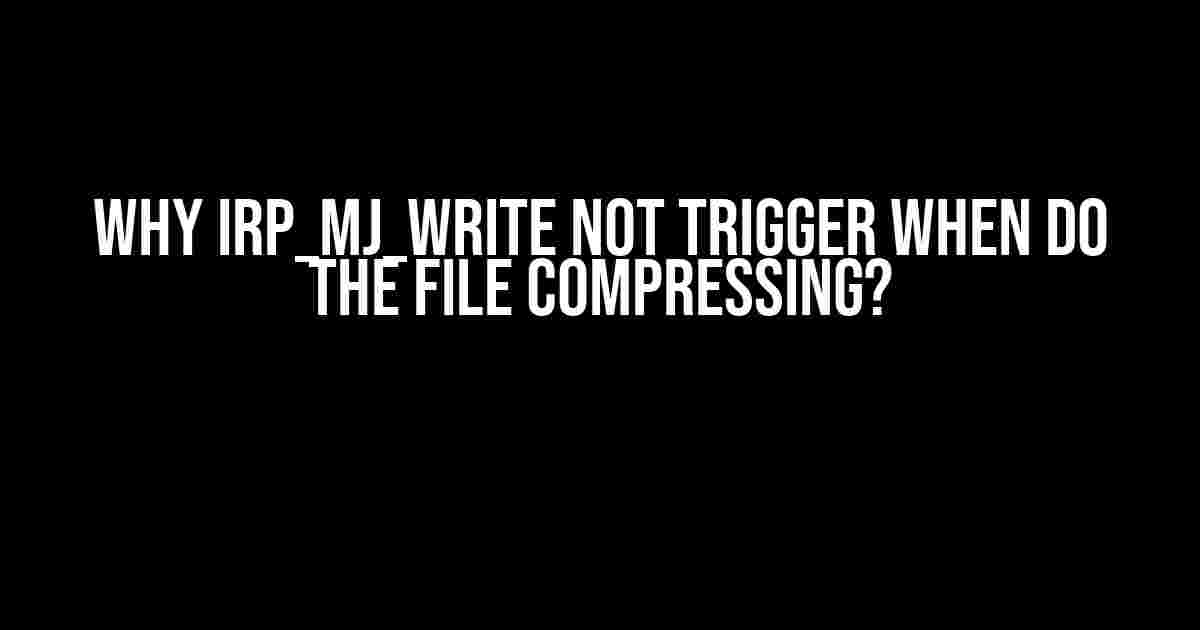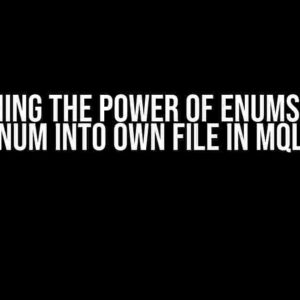Welcome, fellow developers! If you’re reading this, chances are you’re stuck on a pesky issue: IRP_MJ_WRITE not triggering when compressing files. Don’t worry; we’ve got you covered. In this article, we’ll dive deep into the world of IRP major functions, file compression, and Windows kernel-mode drivers. Buckle up, and let’s get started!
What is IRP_MJ_WRITE?
IRP_MJ_WRITE is a major function code used in Windows kernel-mode drivers to request write access to a file or device. When a user application or another driver initiates a write operation, the I/O manager creates an I/O request packet (IRP) and assigns it an IRP_MJ_WRITE major function code. This IRP is then sent to the driver, which is responsible for processing the write operation.
NTSTATUS
DrvDispatch(
PDEVICE_OBJECT DeviceObject,
PIRP Irp
)
{
// ...
switch (Irp->MajorFunction) {
case IRP_MJ_WRITE:
// Process the write operation
break;
// ...
}
return STATUS_SUCCESS;
}
What is file compression?
File compression is a process that reduces the size of a file by encoding its data using various algorithms, making it more efficient for storage or transmission. Common file compression formats include ZIP, RAR, and 7-ZIP. When compressing a file, the compression algorithm reads the original file, compresses its data, and writes the compressed data to a new file or output stream.
// Example of compressing a file using the zlib library
z_stream strm;
strm.zalloc = Z_NULL;
strm.zfree = Z_NULL;
strm.opaque = Z_NULL;
inflateInit(&strm);
FILE *fp = fopen("original_file.txt", "rb");
FILE *fp_compressed = fopen("compressed_file.zip", "wb");
char buffer[1024];
while (!feof(fp)) {
fread(buffer, 1, 1024, fp);
strm.avail_in = 1024;
strm.next_in = buffer;
do {
strm.avail_out = 1024;
strm.next_out = buffer;
inflate(&strm, Z_NO_FLUSH);
fwrite(buffer, 1, 1024 - strm.avail_out, fp_compressed);
} while (strm.avail_out == 0);
}
inflateEnd(&strm);
fclose(fp);
fclose(fp_compressed);
The Mystery of IRP_MJ_WRITE not Triggering
So, why doesn’t IRP_MJ_WRITE trigger when compressing files? Let’s explore the possible reasons:
- Buffering and caching: When compressing a file, the compression algorithm often uses buffering and caching to improve performance. This can lead to the IRP_MJ_WRITE not being sent to the driver immediately, as the compressed data is stored in memory or temporary files instead of being written directly to the disk.
- Intermediate file creation: Compression algorithms might create temporary files or intermediate files during the compression process. These files might not trigger IRP_MJ_WRITE, as they are not the final compressed file.
- File handle and streaming: When compressing a file, the compression algorithm might use a separate file handle for reading and writing, or use streaming APIs (e.g., ReadFile and WriteFile) instead of traditional file I/O functions. This can bypass the IRP_MJ_WRITE major function code.
- Driver and file system interactions: The Windows file system and kernel-mode drivers interact in complex ways. It’s possible that the file compression process interacts with the file system in a way that prevents IRP_MJ_WRITE from being triggered.
Solutions and Workarounds
Now that we’ve explored the possible reasons behind IRP_MJ_WRITE not triggering, let’s discuss some solutions and workarounds:
1. Use IRP_MJ_CLEANUP instead
In some cases, you can use IRP_MJ_CLEANUP to detect when a file is being closed or cleaned up after compression. This might not provide the same level of control as IRP_MJ_WRITE, but it can be a viable alternative.
NTSTATUS
DrvDispatch(
PDEVICE_OBJECT DeviceObject,
PIRP Irp
)
{
// ...
switch (Irp->MajorFunction) {
case IRP_MJ_CLEANUP:
// Process the file cleanup
break;
// ...
}
return STATUS_SUCCESS;
}
2. Monitor file system events
Another approach is to monitor file system events using APIs like ReadDirectoryChangesW or ReadDirectoryChangesExW. This can help you detect when a file is being compressed or modified.
HANDLE hDir = CreateFile(
"C:\\Path\\To\\Directory",
GENERIC_READ,
FILE_SHARE_READ | FILE_SHARE_WRITE,
NULL,
OPEN_EXISTING,
FILE_FLAG_BACKUP_SEMANTICS,
NULL
);
BYTE buffer[1024];
DWORD dwBytesReturned;
while (ReadDirectoryChangesW(
hDir,
&buffer,
1024,
TRUE,
FILE_NOTIFY_CHANGE_LAST_WRITE,
&dwBytesReturned,
NULL,
NULL)
) {
// Process the file system event
}
3. Implement a custom file compression filter driver
A more advanced solution is to develop a custom file compression filter driver that intercepts and processes IRP_MJ_WRITE requests. This allows you to have fine-grained control over the compression process and trigger IRP_MJ_WRITE as needed.
NTSTATUS
CompressionFilterDispatch(
PDEVICE_OBJECT DeviceObject,
PIRP Irp
)
{
// ...
switch (Irp->MajorFunction) {
case IRP_MJ_WRITE:
// Process the write operation and trigger compression
break;
// ...
}
return STATUS_SUCCESS;
}
Conclusion
In conclusion, the mystery of IRP_MJ_WRITE not triggering during file compression is a complex issue with multiple possible causes and solutions. By understanding the underlying mechanisms and interactions between the file system, kernel-mode drivers, and compression algorithms, you can develop effective workarounds and solutions to overcome this challenge.
| Reason | Solution |
|---|---|
| Buffering and caching | Monitor file system events or implement a custom file compression filter driver |
| Intermediate file creation | Use IRP_MJ_CLEANUP or monitor file system events |
| File handle and streaming | Implement a custom file compression filter driver or use IRP_MJ_CLEANUP |
| Driver and file system interactions | Monitor file system events or implement a custom file compression filter driver |
We hope this article has provided you with the insights and guidance you need to tackle the IRP_MJ_WRITE mystery. Happy coding, and may the kernel-mode driver force be with you!
Frequently Asked Question
When compressing files, why does IRP_MJ_WRITE not trigger? Here are some possible reasons why:
Is the compression software using the correct I/O operations?
When compressing files, the software might be using I/O operations that bypass the file system, which means IRP_MJ_WRITE won’t be triggered. For instance, some compressors use user-mode I/O operations or kernel-mode I/O operations that don’t involve the file system. To confirm, check the compression software’s documentation or debug logs to see how it performs I/O operations.
Are the file handles being closed prematurely?
Sometimes, file handles might be closed before the compression is complete, which can prevent IRP_MJ_WRITE from being triggered. Make sure that the file handles remain open throughout the compression process to ensure that the I/O operations are properly handled.
Is the compression software using buffering or caching?
Some compression software uses buffering or caching mechanisms to improve performance. This can lead to IRP_MJ_WRITE not being triggered immediately, as the data might be stored in memory or temporary files before being written to the original file. Check the software’s settings or configuration to see if buffering or caching is enabled.
Are there any file system filters or antivirus software interfering?
File system filters or antivirus software might be intercepting or modifying the I/O operations, causing IRP_MJ_WRITE not to be triggered. Try disabling these filters or software to see if they’re interfering with the compression process.
Is the compression software using asynchronous I/O operations?
Asynchronous I/O operations can lead to IRP_MJ_WRITE not being triggered immediately, as the I/O operations are performed in the background. Check the compression software’s documentation or debug logs to see if it uses asynchronous I/O operations and adjust the compression settings accordingly.


